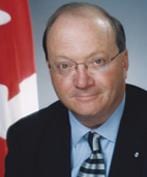The report that recommended the decriminalization of homosexuality in the Commonwealth was in many ways a roadmap to transformational change for the organization, says Conservative Senator Hugh Segal, one of its authors.
Segal says the Eminent Persons Report, delivered at the Commonwealth Heads of Government meeting (CHOGM) in Perth, Australia, in November 2011, took 1,000 hours of work, including travel time, over the space of 14 months, beginning in July of 2010.
Segal says those who compiled the report recommended substantial and transformative changes to the Commonwealth, a body representing approximately 2.1 billion people in 54 countries.
It touched on human rights, the rule of law, democracy, trade, defence and public health issues such as HIV/AIDS, he says. “The real core questions which really are at the root of many of the economic and social difficulties and challenges.”
Segal notes that some differences of opinion emerged during the drafting process.
“If you’re dealing, for example, with the public health implications of laws that criminalize homosexuality, you need to deal with that in a way that makes your purport and intent clear but understands that the range of countries which you’re calling on to engage are a series of countries which span those in which homosexuality is treated as any other human right and is not in any way criminalized, and those countries – in which there are still 41 in the Commonwealth – who are operating under the old British anti-sodomy laws, not to mention those with strong Islamic biases who have their own legislative prejudices,” he says. “We needed to ensure that our wording was such that there was no reason for any government to reject any of the provisions out of hand.”
In the end, the report’s recommendation on decriminalizing homosexuality read: “Heads of Government should take steps to encourage the repeal of discriminatory laws that impede the effective response of Commonwealth countries to the HIV/AIDS epidemic, and commit to programmes of education that would help a process of repeal of such laws.”
Segal says compromises had to be made around the wording, but what was not compromised was the intent.
He notes the fact that some 48 out of 106 recommendations were accepted shows progress is being made, even though there is still a lot of work to be done.
Queen Elizabeth, as head of the Commonwealth, has been credited with pushing the organization to address the recommendations.
Going forward, public consultations on the shape of a future Commonwealth charter will begin in 2012.
Member countries, including Canada, will begin meeting around March, leading up to the Commonwealth foreign ministers’ meeting in New York City in September 2012.
Segal sees an emerging future role for the Commonwealth because he says it is a non-hierarchical organization in which every member has an equal vote, and it provides technical expertise, education and support between countries in a non-threatening way.
However, he says the Secretariat needs reform and a dynamic leadership that is prepared to take risks.
“Our view in the report was the more of that [kind of leadership] we can get the better, and the more likely we are to have a Commonwealth that is a real Commonwealth of the people, and not just a two-year tea-and-debating society.”


 Why you can trust Xtra
Why you can trust Xtra


